Montaigne - Study guides, Class notes & Summaries
Looking for the best study guides, study notes and summaries about Montaigne? On this page you'll find 46 study documents about Montaigne.
Page 3 out of 46 results
Sort by
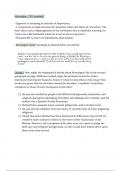
-
Montaigne, "Of Cannibals" Notes
- Class notes • 9 pages • 2023
- Available in package deal
-
- $7.99
- + learn more
Montaigne's essay, "Of Cannibals," explores the cultural differences between European societies and the native Brazilians from his perspective. He advocates for a more tolerant and open-minded approach to understanding other cultures, emphasizing the relativity of customs and practices. Montaigne's upbringing in a diverse environment, exposed to various religions and ethnicities, likely influenced his receptive attitude towards the Brazilian natives. In contrast to the prevailing European at...

-
AP Euro: Important People Latest Updated 2022
- Exam (elaborations) • 17 pages • 2023
-
- $7.99
- + learn more
AP Euro: Important People Latest Updated 2022 Girolamo Savonarola (1452-1498) Dominican friar, attacked government of Florence (Lorenzo de' Medici), corruption of Pope Alexander VI, became religious leader of Florence, eventually excommunicated and executed by pope, shows that common people did not share worldly outlook of elite Petrarch (1304-1374) thought he was living at the start of a new era, new age of intellectual achievement, father of humanism Lorenzo Valla (1406-1457) hum...

-
AP Euro Exam Review Questions and Answers 100% Correct
- Exam (elaborations) • 35 pages • 2023
-
- $8.49
- + learn more
AP Euro Exam Review Questions and Answers 100% Correct Scientific Revolution advances in the knowledge of how nature works, included new discoveries and solved ancient problems, moved knowledge from uncertainty to uncertainty, came in the fields of physics, astronomy, and medicine alchemy the belief that matter could be understood and transformed by mixing substances and using secret formulas, a famous alchemist was Paracelsus, who said that metals as well as plants might have medici...
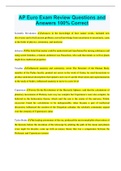
-
AP Euro Exam Review Questions and Answers 100% Correct
- Exam (elaborations) • 35 pages • 2022
- Available in package deal
-
- $9.49
- + learn more
AP Euro Exam Review Questions and Answers 100% Correct Scientific Revolution advances in the knowledge of how nature works, included new discoveries and solved ancient problems, moved knowledge from uncertainty to uncertainty, came in the fields of physics, astronomy, and medicine alchemy the belief that matter could be understood and transformed by mixing substances and using secret formulas, a famous alchemist was Paracelsus, who said that metals as well as plants might have medicinal propert...

-
AP Euro: Important People Latest Updated 2022
- Exam (elaborations) • 17 pages • 2022
- Available in package deal
-
- $9.49
- + learn more
AP Euro: Important People Latest Updated 2022 Girolamo Savonarola (1452-1498) Dominican friar, attacked government of Florence (Lorenzo de' Medici), corruption of Pope Alexander VI, became religious leader of Florence, eventually excommunicated and executed by pope, shows that common people did not share worldly outlook of elite Petrarch (1304-1374) thought he was living at the start of a new era, new age of intellectual achievement, father of humanism Lorenzo Valla (1406-1457) humanist, defe...
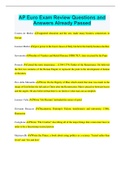
-
AP Euro Exam Review Questions and Answers Already Passed
- Exam (elaborations) • 25 pages • 2022
- Available in package deal
-
- $9.49
- + learn more
AP Euro Exam Review Questions and Answers Already Passed Cosimo de Medici supported education and the arts, made many business connections in Europe Lorenzo Medici gave power to the lower classes of Italy, but he let his family business decline. Savonorola bonfire of Vanities and Ruled Florence STRICTLY, later exectued by the Pope Petrarch coined the term renaissance, , (1304-1374) Father of the Renaissance. He believed the first two centuries of the Roman Empire to represent the peak in the ...
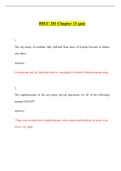
-
HIEU 201 Chapter 13 quiz / HIEU201 Chapter 13 quiz (New-2021) : Liberty University
- Exam (elaborations) • 6 pages • 2021
- Available in package deal
-
- $5.49
- 5x sold
- + learn more
HIEU 201 Chapter 13 quiz / HIEU201 Chapter 13 quiz (Latest): Liberty University 1. The city-states of northern Italy differed from most of Europe because in Italian city-states 2. The republicanism of the city-states proved precarious for all of the following reasons EXCEPT 3. The chivalric code that had expressed social values in the Middle Ages was changed in the Renaissance so that 4. Which of the following wrote texts that challenged traditional views of female potential? ...
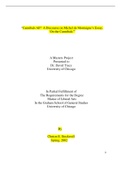
-
“Cannibals All? A Discourse on Michel de Montaigne’s Essay, ‘On the Cannibals’”
- Essay • 53 pages • 2021
-
- $18.49
- + learn more
“Cannibals All? A Discourse on Michel de Montaigne’s Essay, ‘On the Cannibals’” Chapter One Introduction: Cannibals all? This essay is an exploration of Michel de Montaigne’s (1533- 1592) “On the Cannibals.” It will assess Montaigne’s reaction to several views of “the other” in the sixteenth century. The first view is that all non-Europeans were savages, cannibals, less than human and not to be respected or trusted. This was the view that permeated much of Western c...
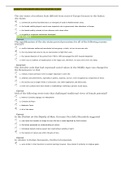
-
LIBERTY UNIVERSITY HIEU 201 CHAPTER 13 QUIZ(VERIFIED)
- Exam (elaborations) • 4 pages • 2022
-
- $14.49
- + learn more
LIBERTY UNIVERSITY HIEU 201 CHAPTER 13 QUIZ The city-states of northern Italy differed from most of Europe because in the Italian city-states a. commercial activity flourished due to a monopoly of trade in Mediterranean areas. b. the feudal nobility played a much more important role in government than elsewhere in Europe. c. the feudal nobility refused to form alliances with urban elites. d. no guilds or corporate institutions developed. The republicanism of the city-states prov...
Montaigne, "Of Cannibals" Notes, Christine de Pizan, The Path of the Long Study Notes, Marguerite de Navarre's Heptameron, Erasmus "Paraclesis" Notes, Boccaccio, The Decameron Notes, Dante's Inferno Notes

Did you know that on average a seller on Stuvia earns $82 per month selling study resources? Hmm, hint, hint. Discover all about earning on Stuvia


